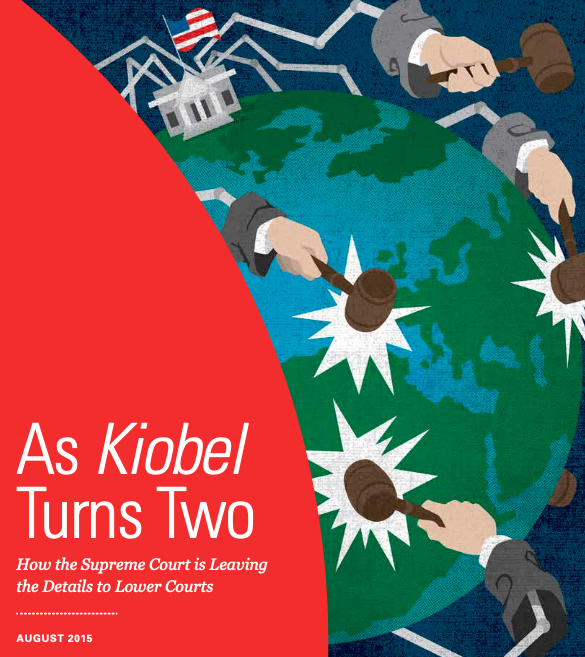On December 1, the U.S. Supreme Court heard oral argument in a pair of cases of vital interest to the U.S. business community—Nestlé USA v. Doe I and Cargill, Inc. v. Doe I—to decide whether U.S. companies can be sued under the Alien Tort Statute for international law violations that occur outside the United States. Based on questions from the justices, the Court seems poised to rule in the companies’ favor—although it remains unclear on what grounds.
The Alien Tort Statute, or ATS, allows foreign nationals to file lawsuits in federal court for torts committed in violation of international law. Enacted in 1789, the statute was mostly untouched until the 1980s, when human rights advocates invoked the law to sue foreign governments and foreign officials for alleged humanitarian crimes. When those suits proved unwinnable or uncollectable, plaintiffs turned their sights on corporate defendants and alleged that companies doing business abroad were aiding and abetting torts committed by foreign actors in foreign countries. More than 150 American and non-U.S. companies have been sued under the ATS in the last two decades. Although some of the suits have gone on for more than a decade, no suit against a major company has resulted in a judgment. There is no evidence that ATS lawsuits have actually vindicated the human rights of the injured foreign nationals.
Nestlé is a prime example of this modern breed of ATS litigation. The case was brought in 2005 by plaintiffs claiming to be former child slaves who were trafficked from Mali and forced to labor on cocoa plantations in Côte d’Ivoire. Invoking the ATS, these plaintiffs sued a number of chocolate companies, including Nestlé USA and Cargill, alleging that the companies aided and abetted human rights abuses by providing technical and financial assistance to cocoa plantations that the companies should have known were trafficking in child slaves. The defendants vigorously deny the allegations.
On Tuesday, the Supreme Court heard argument on two specific questions in the case. First, does the ATS apply in a situation where the primary violation of international law allegedly occurred outside the United States—as here, in Côte d’Ivoire? Back in 2013, the Court held that the ATS is not “extraterritorial,” explaining that the law does not apply unless a case “touch[es] and concern[s] the territory of the United States … with sufficient force.” Exactly what that means, however, remains disputed. According to the plaintiffs, Nestlé and Cargill aided and abetted the slavery in Côte d’Ivoire from corporate headquarters inside the United States by providing oversight of the companies’ operations abroad. That connection, the plaintiffs claimed, is sufficiently strong to make the defendants’ behavior “touch and concern” the United States. Nestlé and Cargill disagreed. They argued that whether an ATS claim “touches and concerns” the United States should depend on where the underlying tort and injury occurred. Here, they told the Court, that was in Côte d’Ivoire, not in the United States.
Second, the Supreme Court was asked to decide whether the ATS extends to U.S. corporate defendants at all. The plaintiffs argued that nothing in the statute’s text limits the pool of defendants to individual persons, and that corporate liability is a standard feature of tort law. Nestlé and Cargill, in contrast, argued that international law does not generally recognize a norm of corporate liability, and that only Congress can extend the ATS to a particular category of defendant, such as corporations. Nestlé and Cargill argued further that allowing corporations to be sued often breeds foreign tension among allies of the sort that the ATS was meant to avoid. For support, they pointed to a Supreme Court decision from 2018 holding that the ATS does not provide jurisdiction over foreign corporations and argued that the same rule should extend to domestic companies.
On balance, the justices’ questions on Tuesday reflected considerable skepticism towards the case. Justices on both ends of the ideological spectrum wondered why, after fifteen years, the plaintiffs’ allegations were still so thin regarding the connection of the lawsuit to the United States. Justice Breyer pointed out that the plaintiffs had not accused the American companies of much more than “doing business” with Ivoirian companies engaged in misconduct. Such skepticism suggests that a ruling on extraterritoriality is likely. While several justices also expressed concerns about the consequences that might follow a corporate liability ruling, it was unclear whether a majority of the Court is prepared to declare domestic companies entirely outside the reach of the ATS.
Companies in the United States will be watching closely to see what the Court decides. If it holds that no corporation, domestic or foreign, may be subject to ATS liability, it will end a two-decade string of high-profile lawsuits against companies that are often intended to “name and shame” companies. However, corporate officials could still be named as defendants, and ATS plaintiffs could set their sights on individual officers or directors. Similarly, if the Court holds that the “touch and concern” test requires a tight connection between the allegedly tortious conduct, the alleged injury, and the United States, that will also spell the end of many of these lawsuits. But if the Court rules in plaintiffs’ favor on both issues, then it may breathe new life into human rights litigation against U.S. companies accused of abusive behavior abroad.
The U.S. Chamber of Commerce, together with other business organizations, filed an amicus brief on behalf of the U.S. business community supporting Nestle and Cargill in this case. The Chamber has filed more than fifty amicus briefs supporting U.S. companies in ATS cases in the Supreme Court and lower courts over the last twenty years.
The U.S. Chamber Institute for Legal Reform has written extensively about the problems associated with these ATS cases.

